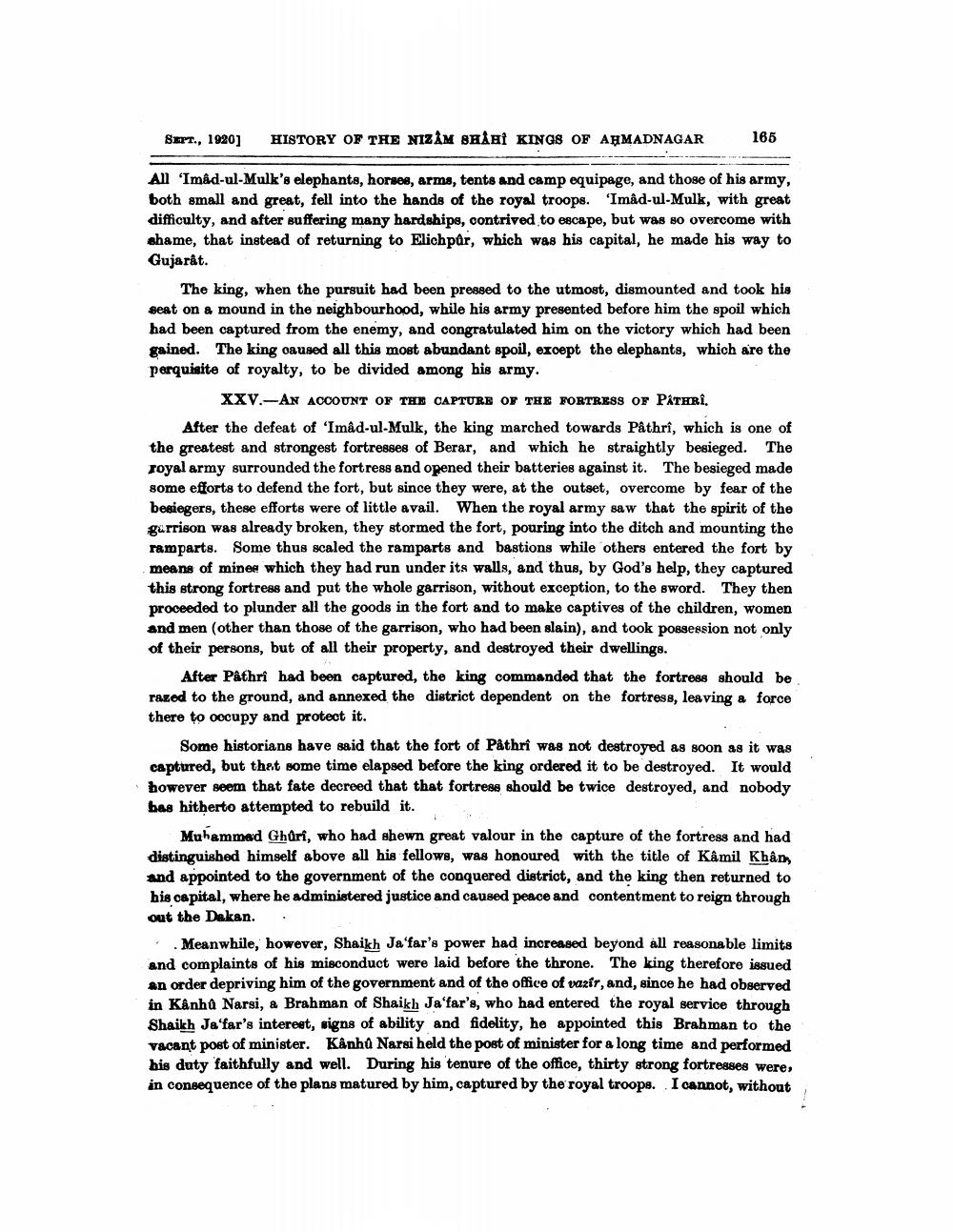________________
Surr., 1920]
HISTORY OF THE NIZAM SHAHI KINGS OF AHMADNAGAR
165
All'Imád-ul-Mulk's elephants, horses, arms, tents and camp equipage, and those of his army, both small and great, fell into the hands of the royal troops. 'Imad-ul-Mulk, with great difficulty, and after suffering many hardships, contrived to escape, but was so overcome with shame, that instead of returning to Elichpar, which was his capital, he made his way to Gujarat.
The king, when the pursuit had been pressed to the utmost, dismounted and took his seat on a mound in the neighbourhood, while his army presented before him the spoil which had been captured from the enemy, and congratulated him on the victory which had been gained. The king oaused all this most abundant spoil, except the elephants, which are the perquisite of royalty, to be divided among his army.
XXV.-AN ACCOUNT OF THE CAPTURE OF THE FORTRESS OF PATHRI. After the defeat of 'Imâd-ul-Mulk, the king marched towards Påthrî, which is one of the greatest and strongest fortresses of Berar, and which he straightly besieged. The royal army surrounded the fortress and opened their batteries against it. The besieged made some efforts to defend the fort, but since they were, at the outset, overcome by fear of the besiegers, these efforts were of little avail. When the royal army saw that the spirit of the gurrison was already broken, they stormed the fort, pouring into the ditch and mounting the ramparts. Some thus scaled the ramparts and bastions while others entered the fort by means of minee which they had run under its walls, and thus, by God's help, they captured this strong fortress and put the whole garrison, without exception, to the sword. They then proceeded to plunder all the goods in the fort and to make captives of the children, women and men (other than those of the garrison, who had been slain), and took possession not only of their persons, but of all their property, and destroyed their dwellings.
After Pathri had been captured, the king commanded that the fortress should be razod to the ground, and annexed the district dependent on the fortress, leaving a force there to oocupy and protect it.
Some historians have said that the fort of Pathri was not destroyed as soon as it was captured, but that some time elapsed before the king ordered it to be destroyed. It would however seem that fate decreed that that fortress should be twice destroyed, and nobody bas hitherto attempted to rebuild it.
Muhammad Ghari, who had shewn great valour in the capture of the fortress and had distinguished himself above all his fellows, was honoured with the title of Kâmil Khân, and appointed to the government of the conquered district, and the king then returned to his capital, where he administered justice and caused peace and contentment to reign through out the Dakan.
Meanwhile, however, Shaikh Ja'far's power had increased beyond all reasonable limits and complaints of his misconduct were laid before the throne. The king therefore issued an order depriving him of the government and of the office of vazir, and, since he had observed in Kanha Narsi, a Brahman of Shaikh Ja'far's, who had entered the royal service through Shaikh Ja'far's interest, signs of ability and fidelity, he appointed this Brahman to the vacant post of minister. Känhů Narsi held the post of minister for a long time and performed his duty faithfully and well. During his tenure of the office, thirty strong fortresses were, in consequence of the plans matured by him, captured by the royal troops. I cannot, without




